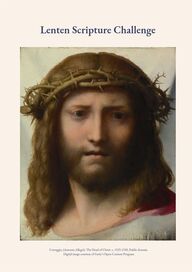
Return to flip book view
Message Lenten Scripture ChallengeCorreggio, (Antonio Allegri). The Head of Christ. c. 1525-1530, Public domain. Digital image courtesy of Getty’s Open Content Program.
Lectio Divina (or Divine Reading) is a way of becoming immersed withSacred Scripture in a deeply personal way. It is a way of developing acloser relationship with God by reflecting prayerfully on His words.The stages of Lectio Divina have been described as compass pointsaround a circle, with the Holy Spirit moving seamlessly between them.PreparePlace yourself in the presence of God and ask the Holy Spirit for help.Read (Lectio)Read the Scripture passage slowly a couple of times. Pay attention toany words or phrases that seem to stand out. Wait patiently for God'sguidance.Reflect (Meditatio)Place your self in the passage. What is God trying to tell me?How is this relevant in my life?Respond (Oratio) Talk to God about the passage. Consider recording yourthoughts in a prayer journal. Respond to Our Lord's messagewith a resolution to act or to change or to just simply listen inprayer.Rest (Contemplatio)Sit quietly in the Presence of God. Relish your time with Our Lord.Lectio DivinaPrayer changes everything.
3/05 + Matthew 6:1-6,16-183/06 + Luke 9:22-253/07 + Matthew 9:14-153/08 + Luke 5:27-323/09 + First Sunday of Lent Luke 4:1-133/10 + Matthew 25:31-463/11 + Matthew 6:7-153/12 + Luke 11:29-323/13 + Matthew 7:7-123/14 + Matthew 5:20-263/15 + Matthew 5:43-483/16 + Second Sunday of Lent Luke 9:28-363/17 + Luke 6:36-383/18 + Matthew 23:1-123/19 + Solemnity of St. JosephMt 1:16,18-21,24 or Luke 2:41-513/20 + Luke 16:19-313/21 + Matthew 21:33-43,45-463/22 + Luke 15:1-3,11-323/23 + Third Sunday of Lent Luke 13:1-93/24 + Luke 4:24-303/25 + Annunciation of the Lord Luke 1:26-383/26 + Matthew 5:17-193/27 + Luke 11:14-233/28 + Mark 12:28-343/29 + Luke 18:9-143/30 + Fourth Sunday of Lent Luke 15:1-3,11-323/31 + John 4:43-544/01 + John 5:1-164/02 + John 5:17-304/03 + John 5:31-474/04 + John 7:1-2,10,25-304/05 + John 7:40-534/06 + Fifth Sunday of Lent John 8:1-114/07 + John 8:12-204/08 + John 8:21-304/09 + John 8:31-424/10 + John 8:51-594//11+ John 10:31-424/12 + John 11:45-564/13 + Palm Sunday Luke 22:14-23:564/14 + John 12:1-114/15 + John13:21-33,36-384/16 + Matthew 26:14-254/17 + Holy Thursday John 13:1-154/18 + Good Friday John18:1-19:424/19 + Holy Saturday Luke:24:1-124/20 + Easter Sunday John 20:1-9 Luke 24:1-12Daily Gospel Readings
Catholic Diocese of Arlington Office of Faith FormationWhat do we mean by the “Passion of Christ?”Excerpt by Monsignor William P. Saunders Straight Answers WebsitePilate could not find conclusive evidence to condemn Jesus. Pilate challenged the chief priests, the ruling class, and the people, “I have examined Him in your presence and have no charge against Him arising from your allegations” (Luke 23:14). When offering to release a prisoner, Pilate asked the crowd about Jesus: “What wrong is this man guilty of? I have not discovered anything about him that calls for the death penalty?” (Luke 23:22). Even Pilate’s wife pleaded with him not to interfere in the case of “that holy man” (Matthew 27:19).Pilate then had Jesus scourged (John 19:1). The Romans used a short whip (flagrum or flagellum) with several single or braided leather thongs. Iron balls or hooks made of bones or shells were placed at various intervals along the thongs and at their ends. The person was stripped of his clothing and whipped along the back, buttocks, and legs. The scourging ripped the skin and tore into the underlying muscles, leaving the flesh in bloody ribbons. The victim verged on circulatory shock, and the blood loss would help determine how long he would survive on the cross. To enhance the scourging of our Lord, the soldiers added other tortures: crowning Him with thorns, dressing Him in a purple cloak, placing a reed in His right hand, spitting upon Him, and mocking Him, “All hail, king of the Jews!” (Matthew 27:27-31).After the scourging, Pilate again presented Christ to the crowd who chanted, “Crucify Him, crucify Him!” Fearing a revolt, Pilate capitulated and handed over Jesus to be crucified. The Romans had perfected crucifixion, which probably originated in Persia, to produce a slow death with the maximum amount of pain. Crucifixion was reserved for the worst of criminals. This punishment was so awful that Cicero (d. 43 BC) introduced legislation in the Roman Senate exempting Roman citizens from crucifixion; this is why St. Paul was beheaded rather than crucified for being a Christian.